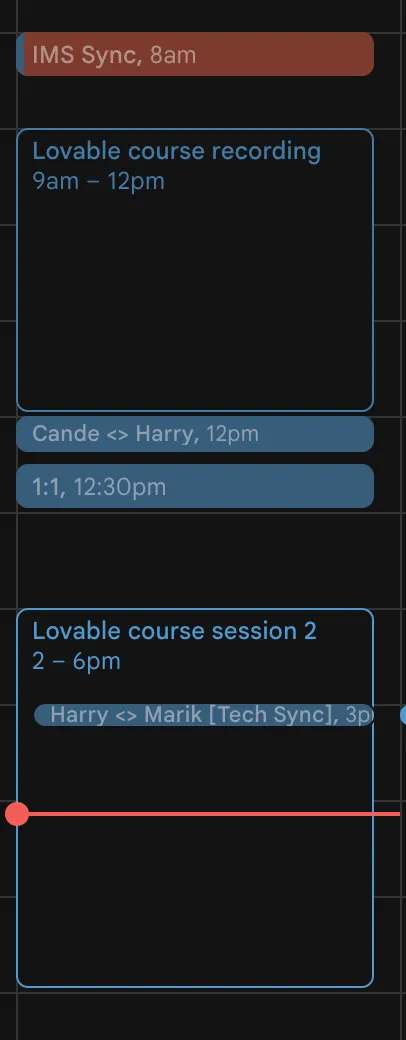
The goal is time management
Pre-Face
Managing your time is more important than you realize.
As I grow my company, I’ve realized that running a team of 17 leaves only so many hours in the day.
So I wanted to remind myself—almost as an exercise—how I like to manage my time… and how you can manage yours as well.
Time Blocking
One of the earliest concepts I learned was blocking out my calendar with a plan for the day. This helps you enter deep work sessions or flow states. You can dive deeper into this idea in Deep Work by Cal Newport.
It’s pretty simple:
- Break down your day with a daily plan: the tasks that must get done.
- Tie this into a weekly plan where you decide on 1–3 key objectives to accomplish.
- Block out time in your calendar for specific tasks.
- Reserve meetings for the afternoon so you can get deep work done in the morning.
Here’s what my calendar usually looks like afterwards:

The key thing I always remind myself: don’t stuff your calendar with endless events. Long, focused blocks are far more effective when it comes to doing meaningful work.
Have an Intake Tray
Throughout the day, people will constantly dump things on you. My favorite framework for this comes from Getting Things Done by David Allen.
In the book, he introduces the idea of an intake tray—a place to capture every small item you want to handle or that gets thrown your way. At the end of the day, you process the tray into buckets: projects, miscellaneous items, or things you can do immediately.
The rule is simple: if something takes less than 2 minutes, do it right away. Everything else gets scheduled and blocked in your calendar.
When I process my tray, I like to attach an action item to each point. That way, when I revisit it, my brain already knows how to start without overthinking.
Protect Your Time
Here’s the trap: people will hand you their tasks and make them yours. This is called “putting the monkey on your back.” Instead of enabling your team to handle the task themselves, you say, “I got it.” Suddenly you’ve signed up for something that was never yours to begin with.
The better approach? Don’t take it on—teach. Show your team member how they can do it themselves. This idea comes from The One Minute Manager Meets the Monkey. The book explains how managers often take on responsibilities their team could (and should) own.
It’s a mindset shift, and honestly, one I’m still working on.
Outro
These three concepts are a great starting point for improving how you manage your time and actually get things done. Execution and finishing things is the ultimate priority. With only a handful of hours each day to make progress, managing your time isn’t optional—it’s essential.